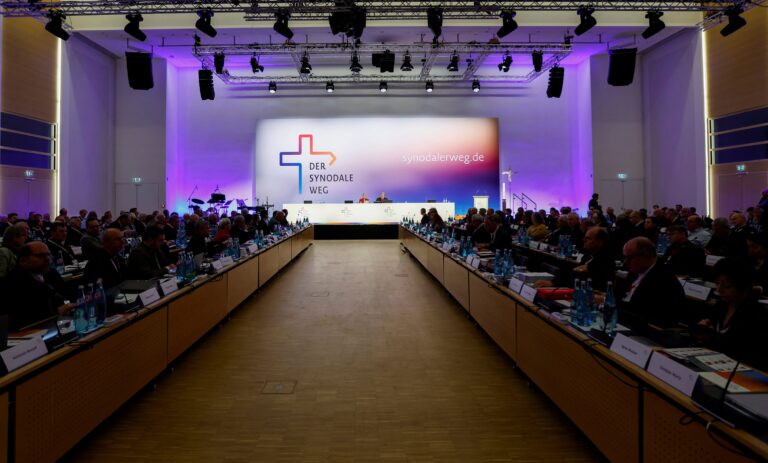The last plenary assembly of the Synodal Path, the project for reforms within the Catholic Church in Germany, ended on Saturday with debates, compromises and decisions on Church reforms.
By abstaining, conservative bishops made it possible for controversial proposals to be adopted, for example on the subject of “gender diversity“ or on the question of what rights women should have in the sacramental life of the Church.
The sessions took place from Thursday to Saturday in a conference centre at the Frankfurt Trade Fair, with 210 synodal members and about 20 international observers taking part. In 2026, a further Synodal Assembly is to consider whether and how the resolutions have been implemented.
The Synodal Assembly voted to ask the Pope to re-examine compulsory celibacy for priests. On other issues, the assembly decided on concrete reforms for the area of the German Bishops’ Conference. For example, women and non-ordained men will now be allowed to preach in Church services. There will be blessing ceremonies for same-sex couples and more respect in the church for trans and non-binary people.
There was also a decision to further tighten the norms for dealing with perpetrators of sexual abuse and for the prevention of such crimes. The last text adopted was a vote calling for the Catholic Church to allow women to become deacons.
A text with “measures against the abuse of women in the Church“ was unanimously adopted on the first reading. A text allowing for the equal participation of laypeople in fundamental decisions in the Church was referred to the Synodal Committee for further discussion. The Vatican had issued clear warnings against such a self-limitation of episcopal powers.
The presidents of the assembly, Bishop Georg Baetzing and the president of the Central Committee of German Catholics (ZdK) Irme Stetter-Karp, told journalists that the results were a success and praised the assembly’s ability to compromise.
Baetzing emphasised that the Synodal Path was also taken ”very seriously“ in Rome and in the Universal Church. It would not lead to a split, and it was not the beginning of a national Church, he said. A distinction had always been made between decisions that can be implemented by bishops in their respective dioceses and “issues that we cannot make progress on alone, but only in consensus with the Universal Church”. For this, too, ”consultations and decisions in the synodal style“ were needed worldwide; Rome was ”not the sole decision-making authority”.
Stetter-Karp stroke a somewhat different tone when she said: “We have not managed to really change the structure of the Catholic Church in Germany.“ However, the Church could not avoid such change. ”Anyone who takes the abuse scandal seriously must clearly work on structural changes,” said the head of the Catholic laypeople’s umbrella organisation.
Looking ahead to the coming years, she said the Synodal Council should be set up by 2026. On the way to the World Synod in Rome, the German Catholics would now “strengthen their networks”. She added: “We are connected with many catholics in other countries who have put trust in us”.
Osnabrueck Bishop Franz-Josef Bode described the Synodal Path’s decisions as “historic“ and said that just a few years ago he himself had not believed that the Church would get that far.
There were several fairly small demonstrations outside the conference venue during the assembly. Some demonstrators demanded equal rights for women in the church while others held banners warning against “heresy and schism”.
After the assembly ended, a Church service was held in Frankfurt Cathedral. The main celebrants were the president of the German Bishops’ Conference, Bishop Georg Baetzing, and the Pope’s ambassador to Germany, Nuncio Nikola Eterovic. Instead of a sermon, there were three “spiritual impulses”. The closing words were spoken by the two presidents of the Synodal Path, Stetter-Karp and Baetzing.
*Originally reported by KNA Germany and Ludwig Ring-Eifel.



